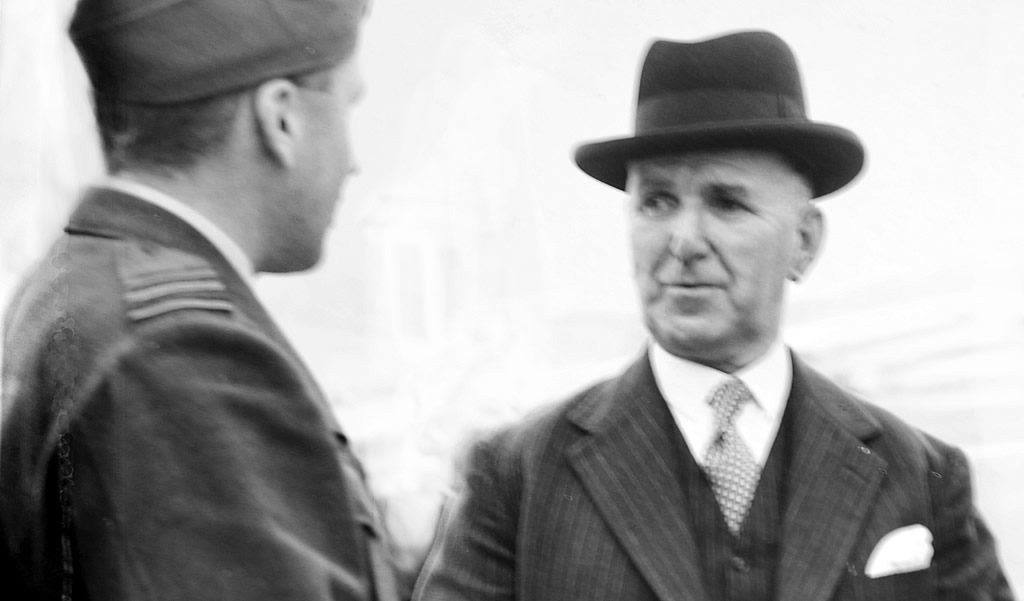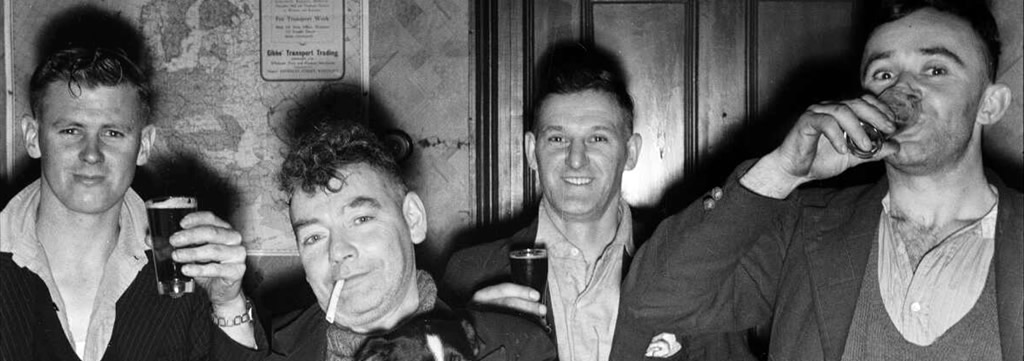On the 30th of March 1945 Gerry wrote in his diary:
All Kiwis collected in the briefing room @ 9.15 to hear a short talk by Hon Mr Holland. He spoke on rehabilitation etc.
The Hon. Sidney George Holland was the Leader of the New Zealand National Party and parliamentary Leader of The Opposition. He had recently visited President Truman at the White House and was now touring England and Europe with the National M.P. for Tauranga, Mr F.W. Doidge, looking at the NZ war effort and discussing post-war issues. They were also meeting with NZ servicemen to discuss repatriation.
The two had planned to visit New Zealand squadrons in Holland and France but decided to postpone that leg of their trip due to the rapid advance of the Allied armies.
In the meantime, they visited Mepal:
At the 75th Squadron they saw preparations for an operation, with aircraft loaded with bombs and all preliminaries. But, at the last moment the operation was “scrubbed,” as the target had been overrun by Allied troops.
As a result the airmen chatted for three hours in an ante-room, plying Mr Holland with questions until midnight. All their questions were about home and Mr Holland was surprised to find that the first 20 questions all had to do with the licensing laws that were to be introduced into New Zealand.
“What is going to be done about them?” was the main query and it was emphasised that New Zealanders do not want to return to conditions of “vertical drinking” in the Dominion after having experiences of “more civilised” laws existing in England, where public houses are open on an average from 11.30 a.m. to 2.30 p.m. and again from 5.50 p.m. to 10.30 p.m.They declared that they wanted to see something of the same system introduced into New Zealand.
– PapersPast, Auckland Star, 5 April 1945.
Top photo: Drinking at the Denniston Hotel, 1945.
– Alexander Turnbull Library, Ref: 1/4-001245-F
Back in New Zealand, restrictive liquor licensing laws dating back to the First World War (1917) meant that all bars closed at 6pm. This had developed a national “6 o’clock swill” culture, with pubs full of men drinking as much as possible after work or sport and before closing time.
“Vertical drinking” was the norm, buying beer at the bar by the half-gallon jug-full, to take back to standing tables in the middle of crowded public bars.
The legal drinking age was 21.
Other outdated aspects of the drinking laws banned Maori from being served in public bars and Returned Service Assn. clubs. (Maori were restricted to buying alcohol from off-licensed vendors.
Publicans were allowed to refuse to serve women in public bars. Alcohol could not be served in restaurants or sold at dances and possession of alcohol in a car was banned within a certain radius of dances and other organised events.
The government established a Royal Commission on Licensing in 1945 to recommend changes and hearings had begun back home. Large numbers of men were still on active service overseas and they were desperate to have their voices heard.

_ Mac Baigent collection., thanks to Jan Balzer.
Other issues on the minds of the Mepal-based Kiwi’s were reported in the same newspaper article:
Next to the question of licensing laws came that of the future of the R.N.Z.A.F.. It was obvious, said Mr Holland, that many volunteers to go both to Burma and the Pacific theatres will be forthcoming, if required.
– PapersPast, Auckland Star, 5 April 1945.
Then came queries about gratuities, and the men declared it was time that some announcement was made. There also were many questions on the cost of housing, one being “what is it going to cost me to buy back my £1200 house?”
It also is obvious, said Mr Holland, that many airmen will be keen to establish their own businesses in New Zealand on their return, and they are anxious for knowledge of points like licensing and permits.
Next morning the station was informed that Mr Holland would be at the briefing room if any New Zealanders cared to see him and, to his surprise, some 200 men arrived and again there were questions for one and a-half hours. Again questions on licensing laws took precedence.
Mr Holland, who was accompanied by Wing-Commander L. A. Robertson on the visit, also met Wing-Commander C. H. Baigent. D.F.C. and bar, the squadron’s 22 year-old commanding officer with whom he was greatly impressed.

– PapersPast, NZ Herald, 12 June 1945.
In England Gerry and his fellow Kiwis had enjoyed a more relaxed drinking culture encouraged by small, cosy pubs serving meals and staying open into the late evening. They had also experienced the many restaurants, dance halls and shows that contributed to a healthy, vibrant night-life.
Sadly, their wishes for licensing law changes were not heeded and after the excitement of the war and the many cosmopolitan joys of England, a bleak social landscape added to the general let-down felt by many servicemen returning home to New Zealand.
It was not until 1948 that some of the Royal Commission’s recommendations were passed into law and Maori were allowed to drink in public bars and RSA clubs.
A referendum on licensing hours was held in 1949 but incredibly, suggested changes were defeated and 6 o’clock closing continued in New Zealand until 1967!

